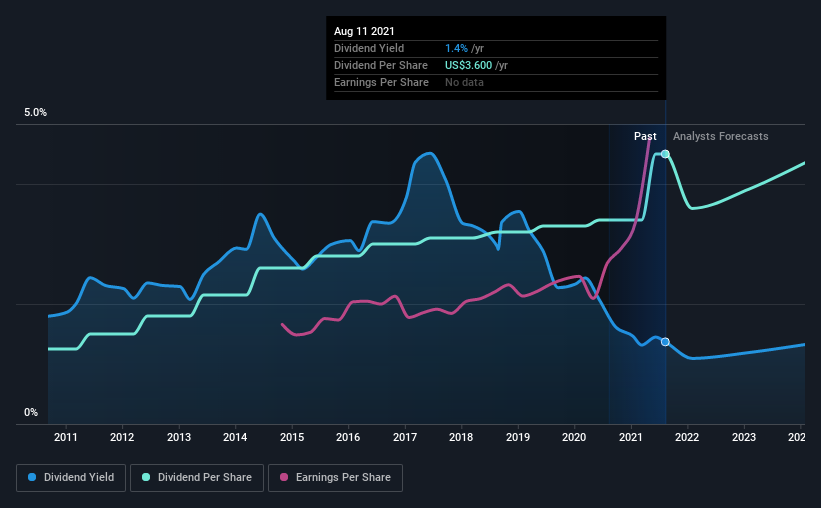Is It Smart To Buy Target Corporation (NYSE:TGT) Before It Goes Ex-Dividend?
Target Corporation (NYSE:TGT) stock is about to trade ex-dividend in four days. The ex-dividend date is one business day before a company's record date, which is the date on which the company determines which shareholders are entitled to receive a dividend. The ex-dividend date is important as the process of settlement involves two full business days. So if you miss that date, you would not show up on the company's books on the record date. In other words, investors can purchase Target's shares before the 17th of August in order to be eligible for the dividend, which will be paid on the 10th of September.
The company's next dividend payment will be US$0.90 per share, and in the last 12 months, the company paid a total of US$3.60 per share. Calculating the last year's worth of payments shows that Target has a trailing yield of 1.4% on the current share price of $263.01. If you buy this business for its dividend, you should have an idea of whether Target's dividend is reliable and sustainable. We need to see whether the dividend is covered by earnings and if it's growing.
Check out our latest analysis for Target
Dividends are typically paid out of company income, so if a company pays out more than it earned, its dividend is usually at a higher risk of being cut. Target has a low and conservative payout ratio of just 22% of its income after tax. Yet cash flows are even more important than profits for assessing a dividend, so we need to see if the company generated enough cash to pay its distribution. It paid out 17% of its free cash flow as dividends last year, which is conservatively low.
It's positive to see that Target's dividend is covered by both profits and cash flow, since this is generally a sign that the dividend is sustainable, and a lower payout ratio usually suggests a greater margin of safety before the dividend gets cut.
Click here to see the company's payout ratio, plus analyst estimates of its future dividends.
Have Earnings And Dividends Been Growing?
Stocks in companies that generate sustainable earnings growth often make the best dividend prospects, as it is easier to lift the dividend when earnings are rising. If earnings fall far enough, the company could be forced to cut its dividend. Fortunately for readers, Target's earnings per share have been growing at 18% a year for the past five years. The company has managed to grow earnings at a rapid rate, while reinvesting most of the profits within the business. This will make it easier to fund future growth efforts and we think this is an attractive combination - plus the dividend can always be increased later.
Another key way to measure a company's dividend prospects is by measuring its historical rate of dividend growth. Since the start of our data, 10 years ago, Target has lifted its dividend by approximately 14% a year on average. It's great to see earnings per share growing rapidly over several years, and dividends per share growing right along with it.
To Sum It Up
Has Target got what it takes to maintain its dividend payments? We love that Target is growing earnings per share while simultaneously paying out a low percentage of both its earnings and cash flow. These characteristics suggest the company is reinvesting in growing its business, while the conservative payout ratio also implies a reduced risk of the dividend being cut in the future. Target looks solid on this analysis overall, and we'd definitely consider investigating it more closely.
With that in mind, a critical part of thorough stock research is being aware of any risks that stock currently faces. Our analysis shows 2 warning signs for Target and you should be aware of these before buying any shares.
A common investment mistake is buying the first interesting stock you see. Here you can find a list of promising dividend stocks with a greater than 2% yield and an upcoming dividend.
This article by Simply Wall St is general in nature. We provide commentary based on historical data and analyst forecasts only using an unbiased methodology and our articles are not intended to be financial advice. It does not constitute a recommendation to buy or sell any stock, and does not take account of your objectives, or your financial situation. We aim to bring you long-term focused analysis driven by fundamental data. Note that our analysis may not factor in the latest price-sensitive company announcements or qualitative material. Simply Wall St has no position in any stocks mentioned.
Have feedback on this article? Concerned about the content? Get in touch with us directly. Alternatively, email editorial-team (at) simplywallst.com.

 Yahoo Sport
Yahoo Sport 






































